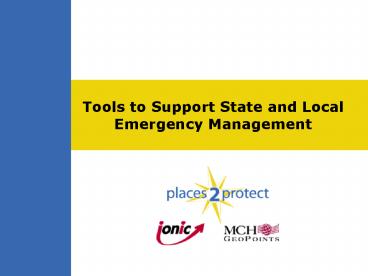Tools to Support State and Local Emergency Management - PowerPoint PPT Presentation
1 / 26
Title:
Tools to Support State and Local Emergency Management
Description:
Historically, there has been no central, regularly maintained and feature rich ... Appendix. SIC Crosswalk Examples. Hospitals. Ambulance Services. Child Care Centers ... – PowerPoint PPT presentation
Number of Views:56
Avg rating:3.0/5.0
Title: Tools to Support State and Local Emergency Management
1
Tools to Support State and Local Emergency
Management
2
Presentation Objectives
- Explain why places2protectTM was developed
- Describe use cases where places2protect can
provide support for State and Local emergency
management, planning and response needs
3
4 Phases of Disaster Management
4
State Planning and Response
5
Emergency Management Data Hurdles
- Historically, there has been no central,
regularly maintained and feature rich data
resource of first responders - States cannot easily obtain data related to
adjoining states - Lack of standardization
6
Emergency Management Data Hurdles
- Data collection and maintenance is time consuming
and costly - Detailed attribute information, including
size/capacity and other characteristics of
high-risk populations and critical facilities
takes a lot of effort to develop - States can obtain data through licensing, etc.
- Information may be limited (name and address
only) - Data may be dated or incomplete
- Data are not organized for immediate access or
mapping - Data may not be geocoded
- For emergency management, constant contact is
required
7
What is Places2protect?
- Developed to provide all facility data on
emergency medical services, captive populations
community facilities - Many layers in HSIP since its inception
8
Places2protect Databases
- Emergency Medical
- Hospitals
- Urgent Care Centers
- Ambulance Services
- Plus Others
- Emergency Response and Relief
- Public Health Depts.
- Red Cross Chapters
- Plus Others
- Captive Populations.
- Schools and School Districts
- Child Care Centers
- Handicapped Children/Residential Treatment
Centers - Summer Camps
- Nursing Retirement Homes
- Adult Day Care Centers
- Plus Others
9
Places2protect Databases (2)
- Other Captive Populations and or Shelters
- Colleges and Universities
- Jails and Correctional Facilities
- City Governments, including additional addresses
separate from main city hall locations - Churches
- Runaway and Homeless Shelters
10
MCH Lessons Learned for Collecting Emergency
Management Data
- Telephone calling is essential to get 100
response - Need experienced callers with sector expertise
- Need strong scripting and IT that supports
discontinuous interviewing, addition of new
questions, etc. - Data from web crawling needs heavy QA/QC
- Mail out/mail back surveys are helpful but will
never reach 100 coverage - A team approach to calling helps
- The Religious Institutions team is increasingly
helpful in other layers (schools, nursing homes,
etc.). For example, diocese control of nursing
homes. - The nixie corrections program for detecting
address changes is an excellent early warning
system for data changes
11
Use Cases Supported by Places2protect
- Mitigation phase
- Analyze proximity of sensitive populations
(seniors, children, etc.) to flood plains,
pipelines, other hazards, etc. - Preparedness phase
- Monitor ratio of EMS resources to critical
facilities to populations - Maintain current facility and attribute inventory
for evacuation planning
12
Use Cases Supported by Places2protect
- Disaster response phase is how immediate action
is undertaken - Know hospitals attributes (e.g., helipads, burn
units, ICUs, beds) - Redirect to alternative sites when hospitals are
at capacity (i.e., nursing facilities, clinics,
or other evacuation sites) - Current contacts and locations available to first
responders
13
Use Case Examples
14
Use Case Examples
Show me Houston hospitals
15
(No Transcript)
16
(No Transcript)
17
Where is a nearby ambulance service?
Use Case Examples
18
(No Transcript)
19
What places are at risk in severe weather?What
are the evacuation priorities?
Use Case Examples
20
Schools in the Path of Severe Weather
21
Web Services Architecture - IONIC
22
Services Architecture for GEOINT Simple Powerful
- Common Services Framework
- HTTP, XML
- ISO 19128, ISO 19115, 19139
- ISO 19119 (Services Metadata)
- OGC Context, WFS, WCS, SLD
- Geography Markup Language (GML)
- OGC Catalog Database
- EPSG Coordinate Database
- GEOTIFF, JPEG, PNG, others
- JPEG 2000
- WSDL, SOAP, UDDI
- JSR 168
Based on Standards Listing for National System
for GEOINT
23
Appendix
- SIC Crosswalk Examples
24
Hospitals
25
Ambulance Services
26
Child Care Centers































